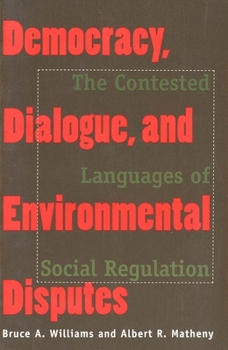Democracy, Dialogue, and Environmental Disputes: The Contested Languages of Social Regulation
Select Format
Select Condition 
Book Overview
At every level of government, environmental regulation is under siege. In Washington, it has been attacked first through the "New Federalism" and now through the "Contract with America." Outside the capital, environmental regulation is the subject of controversy as state and local officials struggle with new responsibilities, threats of industry exit, and challenges from grassroots groups. This book addresses the conundrum of regulation by tracing its source to the competing characterizations of regulatory legitimacy that have accompanied the growth of the American state. Bruce Williams and Albert Matheny identify three distinct languages--managerial, pluralist, and communitarian--used to articulate competing visions of regulation. They argue that each language posits a different understanding of the public interest and therefore a different relationship between the state, the market, and the public. Because all three languages are invoked in regulatory debates, disputants talk past one another, leaving fundamental issues of legitimacy and democracy unresolved or masked by unexamined assumptions. The authors propose a dialogic model for analyzing regulatory policymaking, drawing on postmodernist theory that claims that establishing single languages for understanding the world inevitably distorts communication. They then apply their analysis to case studies of actual environmental disputes over hazardous waste regulation in the 1980s and 1990s in New Jersey, Ohio, and Florida.
Format:Paperback
Language:English
ISBN:0300075545
ISBN13:9780300075540
Release Date:May 1998
Publisher:Yale University Press
Length:272 Pages
Weight:0.90 lbs.
Dimensions:0.6" x 6.2" x 9.2"
Customer Reviews
1 rating
Mervelously Enlightening!
Published by Thriftbooks.com User , 18 years ago
Bruce Williams and Albert Matheny put together a cohesive collection of insights into the regulation of hazardous wastes. This book is all about dialogue, and the characters that come into play here are on three very different levels. Of course the unspoken character is the environment, and that is the one that is the most impacted by the discussions. This book illustrates just how confused and confusing policy making can be. This book is a fantastic read, but also very frustrating when you really think about the implications.





